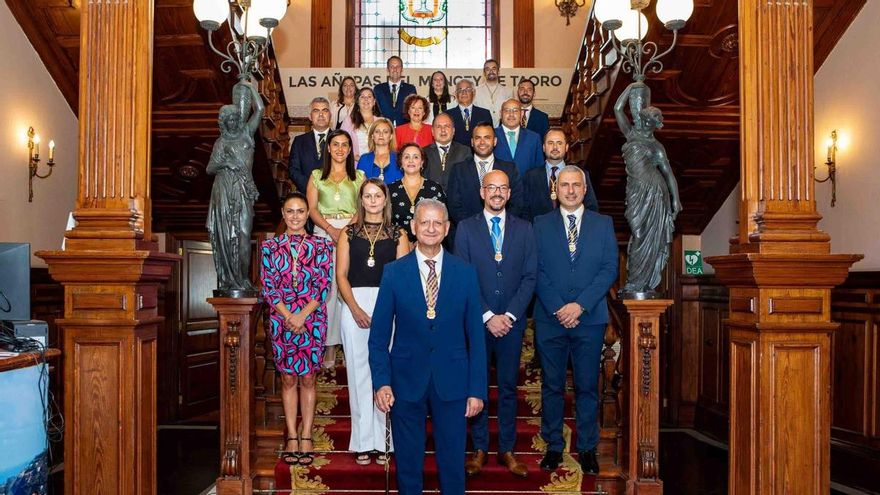
The mayor of La Orotava, Francisco Linares (CC)stop collecting your salary from villero town hall and will only receive allowances for attendance at plenary sessions and other collegiate bodies. For the first time since he became mayor of the town in 2013, Linares’s salary will not come from the municipal coffers but from the Parliament of the Canary Islands, where he debuted as a regional deputy. The nationalist politician Maintains direct management of the Education and Culture areasand leads a government team in which there are no major changes in the distribution of the main areas. In the absence of Linares’ functions in the CC Parliamentary Group, the villero president will receive a salary of at least 4,300 euros per month, with the two extra payments prorated. To this will be added some supplements, diets and compensation for assistance, which raises the average salary of Canarian deputies above 5,000 euros per month.
In the organization chart for the 2023-2027 term in the Town Hall of La Orotava there will be five councilors released full timewhich will charge a monthly salary of 3,300 euros grossand another seven with 75% working hours, whose salary will be about 2,200 euros gross. In addition, the payment of 180 euros for attendance of councilors at plenary sessions and each political group will receive an allowance of 1,500 euros per month.
The town government will have two new faces, the mayors Sergio Martinwhich assumes Electronic Administration, New Technologies, Library, Archive and Museums, and Carlos Diazwhich will be in charge of Sports.
He Town Hall of La Orotava hosted this Thursday, June 22, a brief plenary session to approve the political organization of the new government, a proposal that it went ahead with the votes in favor of the 13 councilors of CCthe abstention of the four of the PSOE and the two of the PP, and the vote against of the two of the Assembly for La Orotava.
The ordinary plenary sessions will be held in this term on the last Monday of each month at 9:00 a.m.
Philip David Benitez he will continue to manage the Economy, Treasury, Patrimony, Human Resources, Commerce and Control of Concessionary Companies, and he will also be the new municipal spokesman; Narciso Perez it will be in charge of the areas of Land Management and Planning, Strategic Projects and Security; yurena louis maintains Municipal Services, Works and Accessibility; Belen Gonzalez continues to lead Social Welfare, Equality and Housing, while Delia Escobar it retains the areas of Tourism, Cultural Heritage, Citizen Participation and Infant Schools, although it delegates Library, Archive and Museums to Sergio Martín.
Felipe David Benítez will be the new municipal spokesperson for CC
The Fiestas, Agriculture and Livestock areas will continue to be in the hands of Alexis Pacheco; dario afonso will manage Youth and Consumption, which in the previous mandate had yayi garcia; Daisy Ramos it is in charge of Training, Employment, Parks and Gardens; yayi garcia Health, Animal Welfare, Public Transport and Drug Addiction, and Luis Perera He will be in charge of the Environment, Sustainability, Fight against Climate Change, Mobile Park and Cemetery areas.
The five councilors released full-time They are Delia Escobar, First Deputy Mayor; Felipe David Benítez, second deputy mayor; Narciso Pérez, who holds the third Tenure of Mayor; Belén González and Yurena Luis, who will be the fourth and fifth deputy mayors, respectively. The seven councilors partially released they are José Darío Afonso and Deisy Ramos, who will occupy the sixth and seventh tenures of mayor; Alexis Pacheco; Luis Perera; Yayi Garcia; Sergio Martin, and Carlos Diaz.
The Ordinary plenary sessions are moved in this mandate to the last Monday of each month, at 9:00 a.m.. Likewise, the day and time of the informative commissions were set, and the allowances of 180 euros for attendance in plenary session and the monthly allocation of 1,500 euros to political groups are maintained.
The PSOE sees the number of released councilors as excessive
The PSOE of La Orotava considers it excessive that the Villa Government has five 100% released councilors, seven 75% released councilors and up to seven positions as trusted personnel. The Municipal Socialist Group recognizes that these designations and appointments “are protected by legislation” and that, from the economic and legal point of view, “the proposal is reported positively.” However, the PSOE considers “this decision somewhat striking, when it is well known that we have practically all the services provided by concessionary companies, therefore, in our opinion, this high number of released councilors and of trusted personnel. We understand that they are part of a structure that goes beyond the management of this council and seems to serve other purposes, more of a propaganda nature”. The socialist spokesperson, María Jesús Alonso, demands that “the number of trust personnel confidence and the allocations set at least have a positive impact on municipal management, and the control function that is made over the provision of municipal services by the companies that are concessionaires”.














